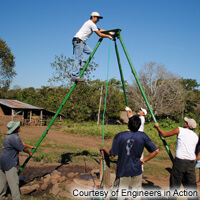Engineers in Action

Project Information
Facilitating potable water, sanitation, and irrigation for remote indigenous villages.
Describe the need affecting community
How will this Advance project help to address the need?
EIA hires Bolivian engineers to work with poor local Bolivian communities to develop partnerships to solve ‘community-determined’ priority needs. EIA uses a “Community Selection Process” to determine the ability of the communities to complete and sustain a project. EIA listens to their self-determined priority needs and then builds a coalition of partners who will assist with solutions, instead of pushing one ‘type’ of project on the community. EIA requires local funding for a portion of the project. EIA brings the highest level of engineering design, often from US engineering universities and professionals. EIA develops “Sustainability Plans” for each project which are tailored to the specific needs and capabilities of that community. This may involve training for local leaders from EIA and other NGO’s. EIA coordinates and provides logistics for groups that come to work on the project. Since EIA hires local engineers, we are available to the communities for consultation and support for the sustainability of the project (operation, maintenance and repairs) for years following completion of the project.
Describe the primary goal of the project
EIA’s primary goal is to partner with those living in poor village in Bolivia, and by 2017 in Ecuador, to build their capacity to improve their health and economic situation by providing sustainable solutions to the self-determined needs of these villages. The long term impact is improved health with a reduction of waterborne diseases and under 5 mortality rate; and greater income for villagers from increased agricultural production.
Describe the change you would like to see in the community as a result of this Advance project
A. Where we are doing water/sanitation/WASH training projects: A decrease in waterborne diseases, decrease in “Under 5 Mortality Rate”, increased knowledge and use of WASH practices in the village. B. Where we are doing economic/agricultural development projects such as bridges, irrigation, erosion control etc, we expect to see most families will recognize an increase in their income and a diversification of their diet.
Contact Information
Ethan Gingerich
Executive Director
ethan.gingerich@eiabridges.org

